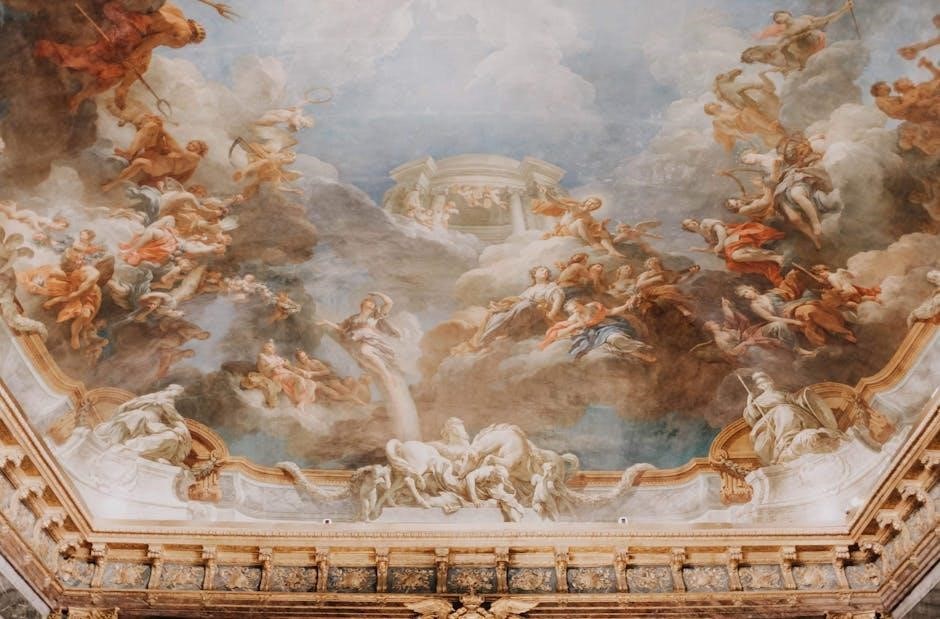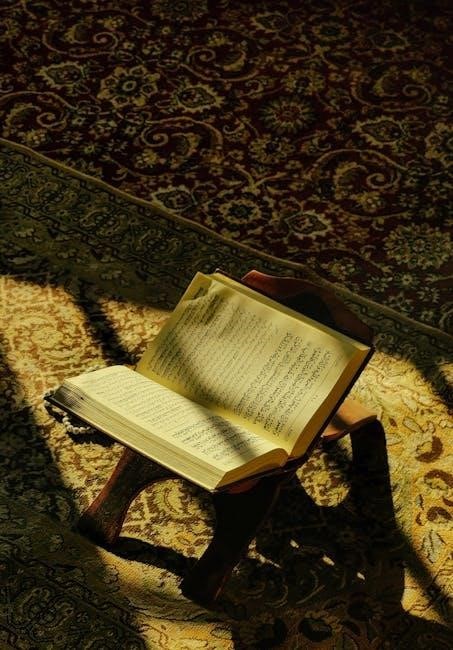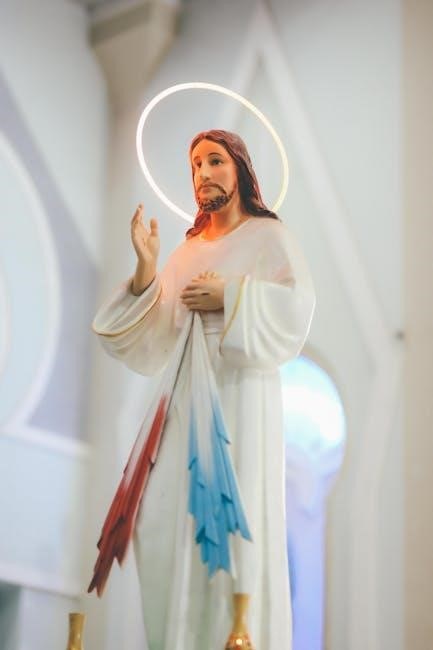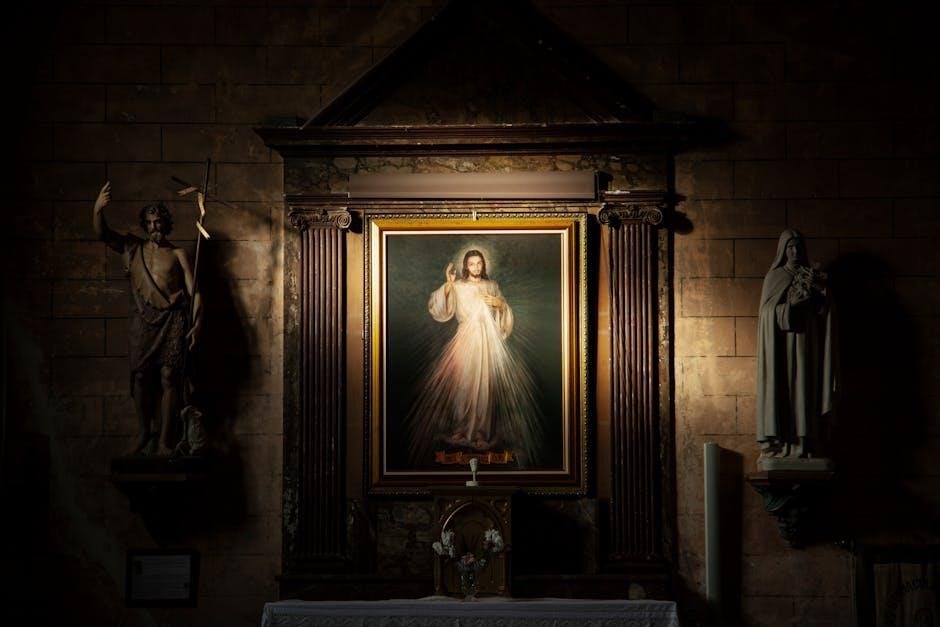
divine mercy novena pdf
Find the Divine Mercy Novena PDF here. Download your free prayer guide and deepen your faith with the powerful 9-day novena.
The Divine Mercy Novena is a nine-day prayer devotion beginning on Good Friday, revealed to Saint Faustina Kowalska. It prepares for the Feast of Divine Mercy, seeking mercy for various souls through specific daily intentions and the Chaplet of Divine Mercy.
What is the Divine Mercy Novena?
The Divine Mercy Novena is a nine-day prayer cycle revealed to Saint Faustina Kowalska, starting on Good Friday. It involves praying the Chaplet of Divine Mercy, along with specific daily intentions for various groups of souls, such as all mankind, priests, and those separated from the Church. Each day focuses on immersing these souls in God’s mercy, as requested by Jesus in Faustina’s visions. The novena culminates on the Feast of Divine Mercy, emphasizing trust in God’s mercy and the salvation of souls. It is a powerful devotion rooted in Catholic tradition, fostering spiritual renewal and compassion.
Significance of the Divine Mercy Novena in Catholic Devotion
The Divine Mercy Novena holds profound significance in Catholic devotion as a powerful expression of faith and trust in God’s mercy. Revealed to Saint Faustina, it emphasizes the limitless compassion of Jesus, encouraging believers to seek forgiveness and intercede for others. The novena’s structured prayers and daily intentions create a meaningful spiritual journey, fostering a deeper connection with Christ. It also serves as a preparation for the Feast of Divine Mercy, highlighting the importance of mercy in Catholic teachings. By participating, faithful Catholics experience spiritual renewal, comfort, and a renewed commitment to living mercifully, reflecting the core of Jesus’ message.

Origins of the Divine Mercy Novena
The Divine Mercy Novena originated from revelations to Saint Faustina Kowalska by Jesus, beginning on Good Friday and culminating on the Feast of Divine Mercy.

Saint Faustina Kowalska and the Divine Mercy Revelation
Saint Faustina Kowalska, a Polish nun, received revelations from Jesus about His Divine Mercy. In her diary, Divine Mercy in My Soul, she recorded the instructions to start the novena on Good Friday. Faustina was canonized in 2000, and her writings emphasize trusting in God’s mercy. The novena, as revealed, involves praying for specific groups of souls each day, immersing them in God’s mercy. Faustina’s role was crucial in spreading this devotion, which has become a cornerstone of Catholic spirituality worldwide.
The Role of Good Friday in Starting the Novena
Good Friday marks the beginning of the Divine Mercy Novena, as revealed to Saint Faustina. Jesus instructed her to start the novena on this day, emphasizing its significance in the Catholic faith. The novena’s commencement on Good Friday symbolizes the outpouring of God’s mercy through Christ’s sacrifice. It prepares believers for the Feast of Divine Mercy on the Sunday after Easter. Each day of the novena focuses on specific intentions, starting with prayers for all mankind. This nine-day prayer cycle reflects the divine plan to immerse souls in God’s mercy, as revealed through Faustina’s spiritual diary.
Structure of the Divine Mercy Novena
The Divine Mercy Novena is a 9-day prayer cycle starting on Good Friday, featuring the Chaplet of Divine Mercy and specific daily intentions.
Overview of the 9-Day Prayer Cycle
The Divine Mercy Novena is a nine-day prayer cycle beginning on Good Friday, as requested by Jesus through Saint Faustina. Each day focuses on specific intentions, such as praying for the souls of mankind, priests, the merciful, and those separated from the Church. The novena involves reciting the Chaplet of Divine Mercy daily, along with prayers for the designated group of souls. This structure emphasizes immersion in God’s mercy, seeking forgiveness and grace for all humanity. The cycle culminates on the Feast of Divine Mercy, celebrated the Sunday after Easter.
Daily Intentions and Prayers for Each Day
The Divine Mercy Novena includes specific daily intentions, each focusing on a different group of souls. Day 1 is for all mankind, Day 2 for priests and religious, Day 3 for the merciful, Day 4 for the detached, Day 5 for those separated from the Church, Day 6 for the faithful, Day 7 for those who led others astray, Day 8 for those who caused ruin, and Day 9 for those who oppressed the Sacred Heart. Each day’s prayer includes the Chaplet of Divine Mercy and a specific intention, emphasizing mercy and forgiveness. The novena closes with a prayer of trust in Jesus’ mercy.

The Chaplet of Divine Mercy
The Chaplet is a powerful prayer using rosary beads, combining the Our Father, Hail Mary, and Apostle’s Creed with specific mercy-focused petitions. It emphasizes trust and divine forgiveness, as revealed to Saint Faustina.
How to Pray the Chaplet of Divine Mercy
To pray the Chaplet, begin with the Sign of the Cross and recite the Our Father, Hail Mary, and Apostles’ Creed. On each rosary bead, say the prayer: Eternal Father, I offer You the Body and Blood, Soul and Divinity of Your dearly beloved Son, Our Lord Jesus Christ, in atonement for our sins and those of the whole world. Conclude each set with For the sake of His sorrowful Passion, have mercy on us and on the whole world. End with the Divine Mercy Prayer for divine forgiveness and grace.
Opening and Closing Prayers of the Chaplet
The Chaplet begins with the Sign of the Cross, followed by the Our Father, Hail Mary, and Apostles’ Creed. These opening prayers set a sacred tone, invoking divine presence. The closing prayer, known as the Divine Mercy Prayer, is recited three times: Holy God, Holy Mighty One, Holy Immortal One, have mercy on us and on the whole world. This prayer seeks divine mercy and grace, emphasizing trust in God’s compassion. The closing prayer encapsulates the novena’s essence, imploring forgiveness and blessings for all humanity.
Prayers and Intentions for Each Day
The Divine Mercy Novena includes specific prayers and intentions for each of its nine days, focusing on different groups of souls. Each day’s prayer is accompanied by the Chaplet of Divine Mercy, emphasizing trust in God’s mercy and compassion.
Day 1: Souls of All Mankind
On the first day of the Divine Mercy Novena, prayers are offered for the souls of all mankind, emphasizing God’s universal mercy. The Chaplet of Divine Mercy is prayed, followed by the specific intention for the day: “Today bring to Me all mankind, especially all sinners, and immerse them in the ocean of My mercy.” This day highlights the importance of interceding for humanity, seeking divine forgiveness and grace for all people. It is a powerful start to the novena, fostering trust in God’s infinite mercy and compassion for every soul.
Day 2: Souls of Priests and Religious
On the second day of the Divine Mercy Novena, prayers are directed toward the souls of priests and religious, recognizing their vital role in guiding others toward God. The specific intention for this day is: “Today bring to Me the souls of priests and religious, and immerse them in My mercy.” This prayer seeks divine grace for those dedicated to spiritual service, asking for their sanctification and renewed commitment to their vocations. It emphasizes the importance of supporting clergy and religious in their mission to spread God’s mercy and lead others to salvation through their example and devotion.
Day 3: Souls Most Merciful to Others
On the third day of the Divine Mercy Novena, prayers focus on souls who have shown mercy to others. The daily intention is: “Today bring to Me the souls who are in the prison of purgatory and immerse them in the abyss of My mercy.” This day emphasizes the value of merciful deeds and the hope of eternal rest for those who practiced mercy during their lives. Through specific prayers, believers ask for the souls’ purification and their swift entrance into heaven, highlighting the connection between earthly compassion and divine forgiveness.

Day 4: Souls Detached from Material Goods
On the fourth day of the Divine Mercy Novena, prayers are offered for souls detached from material goods. The intention is: “Today bring to Me the souls who are in the prison of purgatory and immerse them in the abyss of My mercy.” This day focuses on those who, during their lives, renounced worldly possessions and lived simply; Believers pray for their purification, seeking swift entrance into heaven. The novena emphasizes that detachment from material goods is a virtue, aligning with Christ’s teachings. Through prayer, the faithful ask for mercy and eternal rest for these souls, acknowledging their commitment to spiritual wealth over earthly possessions.
Day 5: Souls Who Have Separated Themselves from the Church
On the fifth day of the Divine Mercy Novena, prayers are offered for souls who have separated themselves from the Church. The intention is: “Today bring to Me the souls who have separated themselves from My Church and immerse them in the ocean of My mercy.” This day focuses on those who have strayed from the faith, encouraging prayers for their return. Believers ask for divine mercy to soften hardened hearts and guide these souls back to the Church. The novena emphasizes reconciliation and unity, reflecting Christ’s desire for all to be one in His mercy and love.
Day 6: Souls in the Final Perseverance
On the sixth day of the Divine Mercy Novena, prayers are offered for souls in their final perseverance; The intention is: “Today bring to Me the souls who are in the prison of purgatory and immerse them in the abyss of My mercy.” This day focuses on souls nearing the end of their earthly lives, seeking divine mercy to guide them through their final moments. The novena emphasizes the importance of praying for these souls, ensuring they receive the grace needed to persevere faithfully until death. The Chaplet of Divine Mercy is recited to intercede for their eternal rest and union with God.
Day 7: Souls Who Have Distracted Others from the Path of Salvation
On the seventh day of the Divine Mercy Novena, prayers are offered for souls who have led others away from the path of salvation. The intention is: “Today bring to Me the souls who are particularly ensnared by Satan and immerse them in the abyss of My mercy.” This day focuses on those who have caused others to stray, seeking divine intervention to free them from spiritual darkness. The Chaplet of Divine Mercy is prayed to intercede for their conversion and to counteract the harm caused by their actions, trusting in God’s boundless mercy and forgiveness. This prayer emphasizes the power of divine grace to redeem even the most misguided souls.
Day 8: Souls Who Have Caused Ruin to Others
On the eighth day of the Divine Mercy Novena, prayers are offered for souls who have caused ruin to others. The intention is: “Today bring to Me the souls who are tempted by sensual sins and immerse them in the abyss of My mercy.” This day focuses on those who have led others into moral or spiritual destruction, seeking divine intervention to heal the harm caused. The Chaplet of Divine Mercy is prayed to intercede for their repentance and to restore their relationship with God. The prayer emphasizes the power of divine mercy to redeem even those who have caused great harm.
Day 9: Souls Who Have Oppressed the Most Sacred Heart of Jesus
On the ninth day of the Divine Mercy Novena, prayers are offered for souls who have oppressed the Most Sacred Heart of Jesus. The intention is: “Today bring to Me the souls who have become lukewarm and immerse them in the abyss of My mercy.” This day focuses on those who have neglected or ignored the love and sacrifice of Christ, seeking to rekindle their devotion. The Chaplet of Divine Mercy is prayed to inspire these souls to return to a life of faith and to experience divine forgiveness. The prayer emphasizes the transformative power of mercy to revive even the coldest hearts.
The Divine Mercy Novena culminates in the Feast of Mercy, celebrating God’s boundless love and forgiveness. It underscores the importance of trust in Divine Mercy, transforming lives through prayer and devotion. Jesus’ promise of mercy to those who seek it with trust is central to this devotion, offering hope and redemption to all souls.
The Feast of Divine Mercy and Its Celebration
The Feast of Divine Mercy is celebrated on the first Sunday after Easter, marking the end of the novena. It honors God’s infinite mercy and love, revealed through Saint Faustina. The celebration includes Mass, the Chaplet of Divine Mercy, and veneration of the Divine Mercy image. Catholics are encouraged to receive confession and Holy Communion, symbolizing spiritual renewal. The feast emphasizes mercy, forgiveness, and divine love, inspiring believers to trust in God’s compassion. It serves as a powerful reminder of Jesus’ promise of mercy to those who seek it with faith and trust, fostering a deeper connection to His divine heart.
The Importance of Trust in Divine Mercy
Trust in Divine Mercy is foundational to this devotion, as revealed by Jesus to Saint Faustina. It emphasizes surrendering to God’s infinite love and forgiveness, regardless of one’s past. Jesus promised that those who trust in His mercy will receive abundant grace and peace. This trust is not passive but active, requiring faith and openness to God’s will. Through trust, believers experience spiritual transformation and deeper intimacy with Christ. The Divine Mercy message calls all to live with unwavering confidence in God’s compassion, fostering hope and reconciliation in a world filled with challenges and uncertainties. Trust in mercy is a lifelong journey of faith and surrender.